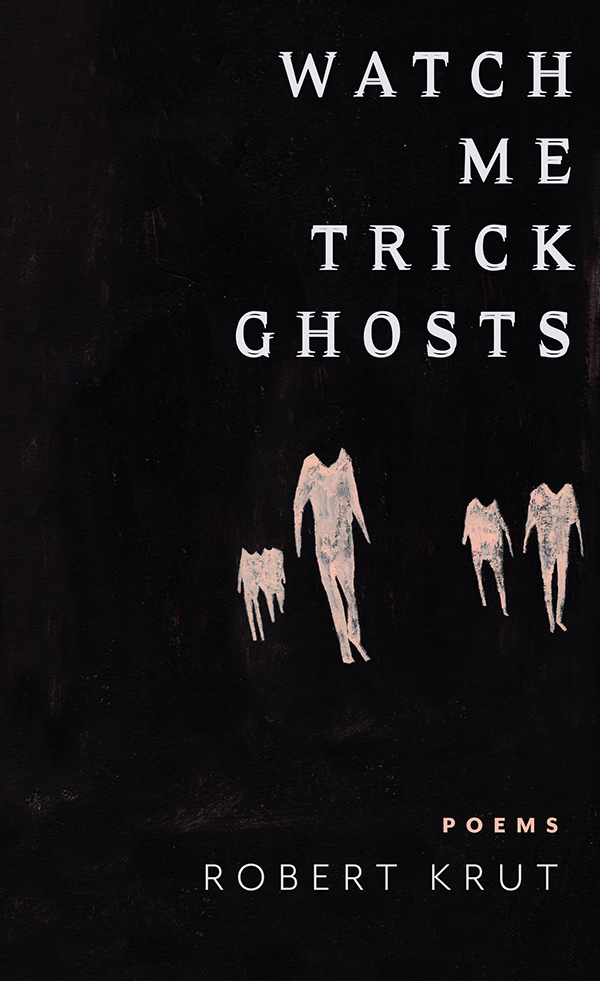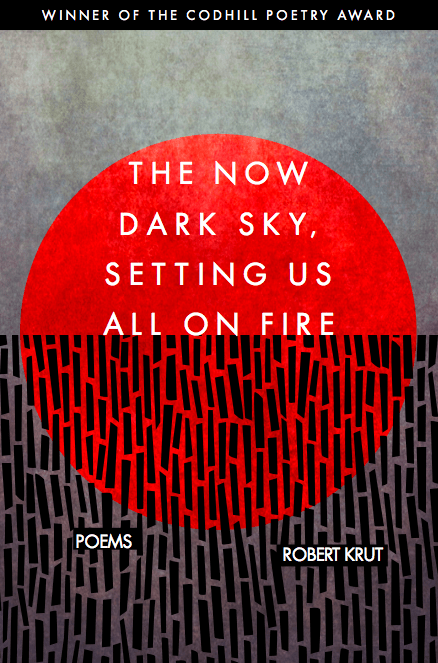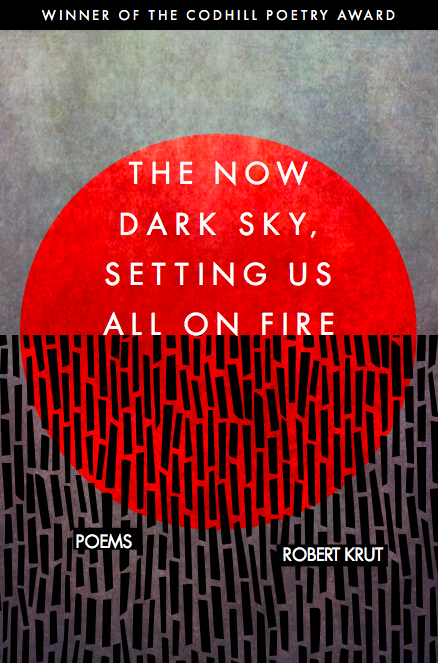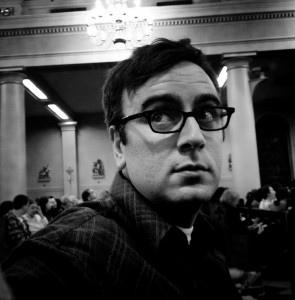Our Issue 28 Poetry Editor, Bree Hoffman, interviewed Robert Krut, a three-time SR contributor, about his new poetry collection Watch Me Trick Ghosts. The interview was conducted via email.
Robert Krut is the author of four books: Watch Me Trick Ghosts (Codhill/SUNY Press, 2021), The Now Dark Sky, Setting Us All on Fire (Codhill/SUNY Press, 2019), This is the Ocean (Bona Fide, 2013), and The Spider Sermons (BlazeVox, 2009). He teaches in the Writing Program and College of Creative Studies at the University of California, Santa Barbara, and lives in Los Angeles.
Bree Hoffman: In a previous interview with Frontier you said that as a writer it is important to be “open to new ideas, new voices, new styles, [and] new suggestions.” What role has teaching poetry professionally played in the conception of your own poems? What have you learned from experiencing writing both inside and outside of the classroom?
Robert Krut: I don’t think I can overstate the importance teaching has played in my own writing, particularly recently. It has helped with my attempts to stay agile, excited, and engaged over the years. Working with students means working with numerous types of writers, each an individual requiring different suggestions, both in terms of reading and writing. There is a responsibility to share the entire scope of literature with them, and present them with the latest and most exciting poetry out in the world right now—this, in turn, helps keep me engaged, as well, and not complacent in my reading and participation.
During lockdown, in particular, my poetry courses were more than classes I was teaching—they were biweekly opportunities to talk with other writers (over Zoom, of course) who were all fully engaged in their process. If any of them happen to read this, in fact, I’d like them to know what an impact they had on my energy and enthusiasm toward writing over the past two years—their interest and passion really provided a spark for my own writing. In Norman Dubie’s great The Clouds of Magellan, he wrote “Work with young writers—never for them,” and it’s a quote I’ve thought about for years and years. It becomes more and more clear to me as a teacher. Working with poetry students isn’t a top-down operation. In the best cases, it is truly an interactive community.
BH: One recurring theme of your poems is the element of grimness that is present in the mundane. In “Walk Don’t Walk Walk Stand Still” we see it in the things people avoid, and in “The Dinner Party” we see it in the wounds people share with one another, sometimes willingly and sometimes not. What were some of your influences when writing these poems?
RK: Grimness in grimness has always been boring—I have always been fascinated by its presence, or at least the implication of its presence, in the mundane, that mysterious element in the everyday, as I’m sure many people are.
Way back in high school, my part time job was at a video store, which was perfect for a movie-obsessed teenager, but also meant I wound up working just past midnight. I would drive home through suburban New Jersey, fascinated by what I was seeing at that hour: stopping at my favorite 24-hour place and seeing people arguing in the parking lot, driving past the school and seeing people smoke right in the middle of the football field, passing a stray dog scratching at the church door near our house. It was all engrossing.
That job not only afforded me a reasonable excuse to be out so late, but it also led me to watch David Lynch’s Blue Velvet for the first of many times, which solidified this interest, and put it right there on the screen—in those opening moments, when Jeffrey finds the ear in the field, I saw the perfect representation of what I found interesting in the world, and it served as a sort of concrete seed for what would come, years later.
That was the same year I read “A Supermarket in California,” which shares similar DNA, the other side of a quiet town, slipping into something doomed. Those are the worlds where this book finds most of its poems; there, or in the flipside, in the mundane of the grim—they go hand in hand.
BH: There is a really interesting relationship that these poems have to other people as well as the world, creating a tone that is isolating and internal. For you, what is the role of these interpersonal connections in “Watch Me Trick Ghosts”?
RK: I sensed from the earliest stages of writing this book that it was going to be a quieter one, one that is, indeed, internal. As the themes began to become clear, it seemed to be the introverted sibling to the extroverted previous collection. This was led by the ideas I wanted to explore, but was surely enhanced by the fact that the vast majority was written during lockdown, where we were all isolated by circumstance. When you mention interpersonal connections, I flash to the fact that I wasn’t walking outside to talk to neighbors up close; there were simple hand waves from across the street. I wasn’t meeting strangers in crowded places; I was driving past closed up shops. This book is not “about” that particular time—that would be too narrow for my taste—but the writing couldn’t help but be influenced by it. In the end, it is indeed an internal book, centered on solitude in some ways, voices you hear when you are alone, and spirits tethered to your body as you move through the day. The title poem was one of the very first, and it served as a sort of guide.
BH: What are you currently working on in your writing and various workshops?
RK: In terms of my own writing, I’ve just been trying to write a little each day right now—sometimes that’s a whole draft of a poem, and sometimes it’s just a few lines. After a book comes out, I typically have an “deep breath” period where I’m writing, little by little, getting back to full momentum for where the poems will go next. As for my courses, this Winter I’ll be teaching a class specifically designed for third-year students who are beginning the process of creating a manuscript for their upcoming senior projects—I’ve taught this for the past few years, and it’s always an exciting process, and never the same. I’m looking forward to reading some great new work, and the chance to work closely with the students.
BH: What advice would you give to fellow writers and readers?
RK: The old standbys still hold. Write every day. Try to write every day. I know that’s an easy thing to say, and it’s hard to truly follow it all the time, but I have found that periods where I really try to write something every day, even something that turns out to be garbage, the momentum leads to truly productive periods.
And read a lot. Specifically, read people who are writing differently than you—don’t wind up in a literary echo chamber.
Finally, writing is such a solitary experience, which is often one of the nicest aspects of it, but it can slow down inspiration and growth. Reach out to friends, and other writers, while working. One of the rare benefits of social media is that, even if you don’t have someone in your immediate circle who writes, or reads poetry, there are ways to find a community, even if it is online. I love the independent nature of writing, alone, in the early morning hours, or late at night, but it’s not until I start sharing, editing, revising, and sharing again, that the poems start to breathe.





 I have a
I have a 